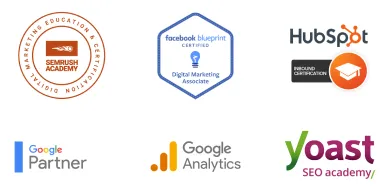TO LEARN IS TO GROW
Learning Center
We do our research and publish our results. Should probably call this the Growing Center.


Getting into WordPress Gutenberg: 4 Reasons to Love Blocks (If You Haven’t Already)
It’s been almost a year since the Gutenberg content editor for WordPress was rolled out, and reception has been generally mixed: some people like the new user-friendly approach to building new content for WordPress, others simply don’t care for it, and there are also those who hate it with a passion.
To this day, a lot of WordPress users ask themselves, “why should I get into Gutenberg now?”
WordPress released the Gutenberg content editor in December 2018, bundled with the version 5.0 iteration of the popular open-source content management system.
Gutenberg was a comparatively radical departure from the classic editor WordPress had since 2004. This new system used blocks, with each block carrying a particular piece of content, code, media file, or some other design element. Blocks can easily be moved around for purposes of changing the layout of a page or post.
Personally, we’ve had our own reservations about using Gutenberg at first. We’ve run it on a number of sites, and right now, we can tell you that it just makes for a better experience as a publisher.
Does Gutenberg make WordPress better? It does for us!
Should you get into Gutenberg now, if you haven’t already? Absolutely– and here are four reasons why:
Gutenberg Will Be WordPress’ New Default Editor
Today, WordPress users have the choice of switching off or doing away with the Gutenberg function, opting instead to stick with the old classic editor.
However, support for the old editor will be discontinued in 2022, an indication that Gutenberg will no longer be optional for users, but rather, mandatory.in a few more years.
Love it or hate it, you have to come to terms that Gutenberg is here to stay.
But you must understand that this is not just a preference, a whim, or a fad. Trends indicate that the blocks-based approach on the WordPress editor is actually the proper way you should now look at data and content.
Gutenberg Helps You Get Organized
Each block in Gutenberg contains one specific form of content: a bit of text, a media file (like a photo or video), a piece of code, a header, a list, and so forth.
With Gutenberg, WordPress users today can now think of posts and pages as unique arrangements of different combinations of blocks
The blocks-based approach of Gutenberg is not entirely new. In fact, block-based approaches have already been in use with modern-day programming, as well as in business strategy, data science, and classification. Ultimately, Gutenberg helps us get with the program, changing the way we now see data and information, and how everything fits in the bigger picture.
Gutenberg Helps Search Engines
Because of this blocks-based approach to publishing content, WordPress publishers now make it easier for Google (and other search engines) to better index our websites and evaluate our content.
Remember, search engines see our posts and pages differently from us humans. While we see words on a page and maybe even pretty pictures or a video or two, all search engines see is lines and lines of different code.
Since our page is now organized in blocks, Gutenberg helps web crawlers determine which blocks contain certain bits of information they’re looking for, and which ones they don’t really have to bother with as much.
Specifically, blocks help Google determine if you have rich snippets that can now occupy position zero, or the information it can easily put up in its Local Pack, and so on.
By “helping” Google and other search engines in this manner, you’re also helping yourself get better visibility and better rankings, and by extension, more traffic, more leads, and (hopefully) more business.
Gutenberg Might Just Be The New Standard
Did you know that Google has invested $1.2 million in WordPress so it can better develop the platform while further leveraging on Gutenberg?
Through the Google News Initiative, the tech giant is now developing “Newspack” on top of the existing WordPress infrastructure. The aim is to make publishing even easier for journalists and storytellers while integrating an array of enhancements that will aid in getting local news and information out to users.
What this means is, while 35% of the entire internet already uses WordPress, it will continue to develop open-source, superior quality platforms for news organizations and other publishers.
How does this new Google project leverage on Gutenberg? Understand that Gutenberg has now “standardized” all the information on our site through this block-centric system. By doing so, expect new themes and plugins to be able to offer so much more in terms of added functionality or better layouts, and so much more.
We expect the new Google Newspack to blow our minds when it’s ready for rolling out. And we believe that this is just the beginning.
Experts predict that this new WordPress environment will now shake up the current development ecosystem, allowing new, forward-thinking developers and early adopters to get a leg up on more established players.

A Final Word on Using Gutenberg
If you don’t already love Gutenberg, we hope that with these in mind, you now have a better understanding of what the future is for WordPress.
Gutenberg represents the next stage in evolution for WordPress. It continues to draw upon the advantages it has as an open-source, community-driven project, and it sets the foundation for a better overall user experience and opens a new market for motivated WordPress developers.
With this clearly new superior content creation tool, is this WordPress’ way of going head-to-head with commercial DIY builders from Wix, Squarespace, Weebly, and others? Perhaps.
Will Gutenberg somehow render other WordPress page builders like Elementor, Site Origin, Beaver Builder, Divi, and others obsolete? Who knows?
Regardless, change has come to WordPress, and change is good. Gutenberg is a good thing. Whether you’re a developer, a publisher, or an end-user, what we’re seeing now with Gutenberg is a quantum leap of sorts for online publishing.
Even more change is coming. And with Gutenberg, you’ll be a lot readier for the future than you’ll ever be as far as your WordPress site is concerned.
Growing Businesses Since 2008
We have helped hundreds of businesses just like yours. Working for or along-side of business owner, managers, staff, or even board of directors, LOJO is ready to be an asset to your business.
Our team has been curated through the years for individual skills, personalities, and capabilities. Our clients put their trust in us to help them grow. We are here to do just that.



Growing Businesses Since 2008
We have helped hundreds of businesses just like yours. Working for or along-side of business owner, managers, staff, or even board of directors, LOJO is ready to be an asset to your business.
Our team has been curated through the years for individual skills, personalities, and capabilities. Our clients put their trust in us to help them grow. We are here to do just that.




Matthew Rogers, President
iProspect Check
After spending several months reviewing multiple proposals from several different companies we engaged LOJO to develop a new website that represents our company effectively. We worked initially with Stephen Platte who helped create the scope of the project. Stephen was knowledgeable and always followed up with me on time and as promised.
He "closed the deal" for LOJO with his professionalism, service orientation and easy going approach. Once we signed the contract we were introduced to Jay Kelly who would be the creative lead for LOJO. This was the most challenging part of the project for my company, as there was no shortage of ideas from our side. Jay managed the project flawlessly, and once we had all agreed to the design, Jay introduced us to Eric.
Eric Lay is one of the founders of LOJO. Eric took the design we had developed and brought it to life. We delivered content as quickly as he requested it. Eric kept the project on task and we responded by exceeding every deadline for content. In turn, once provided, literally not a day went by that Eric didn't add the content and take the next step. In just a few weeks we launched our new website. Eric is a pleasure to work with.
His positive attitude and consultative approach really enhanced the experience and made a big difference for us in the outcome of our project. We would welcome you to visit our website to take a look at the quality work of LOJO. We are very pleased with LOJO and look forward to working with them in the future as we pursue an aggressive SEO strategy."
After spending several months reviewing multiple proposals from several different companies we engaged LOJO to develop a new website that represents our company effectively. We worked initially with Stephen Platte who helped create the scope of the project. Stephen was knowledgeable and always followed up with me on time and as promised.
He "closed the deal" for LOJO with his professionalism, service orientation and easy going approach. Once we signed the contract we were introduced to Jay Kelly who would be the creative lead for LOJO. This was the most challenging part of the project for my company, as there was no shortage of ideas from our side. Jay managed the project flawlessly, and once we had all agreed to the design, Jay introduced us to Eric.
Eric Lay is one of the founders of LOJO. Eric took the design we had developed and brought it to life. We delivered content as quickly as he requested it. Eric kept the project on task and we responded by exceeding every deadline for content. In turn, once provided, literally not a day went by that Eric didn't add the content and take the next step. In just a few weeks we launched our new website. Eric is a pleasure to work with.
His positive attitude and consultative approach really enhanced the experience and made a big difference for us in the outcome of our project. We would welcome you to visit our website to take a look at the quality work of LOJO. We are very pleased with LOJO and look forward to working with them in the future as we pursue an aggressive SEO strategy."

Matthew Rogers, President
iProspect Check
The team at LOJO were wonderful to work with. They are well organized and very patient as we worked through our marketing strategy and developed a well thought out and clear action plan at a reasonable price. We will definitely be back for our future campaign needs."

Jon Crosby, Founder
Dazil

